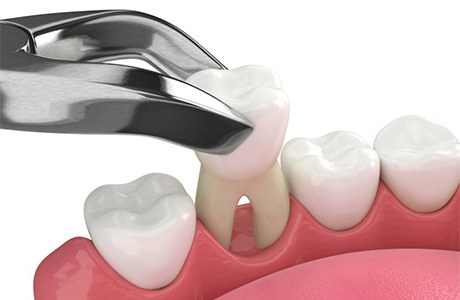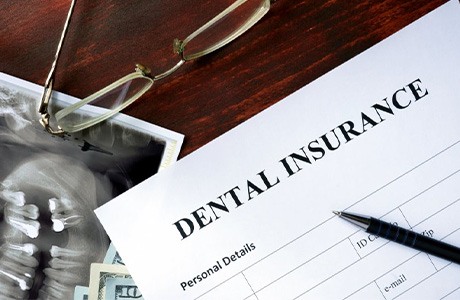Tooth Extractions Goodlettsville
Comfortable Tooth Removal You Can Trust

The overwhelming majority of the time, our team can save even the most damaged teeth, but we’re not miracle workers! If the situation calls for it, our patients can trust us to provide safe, effective, and most of all, comfortable tooth extractions in Goodlettsville. While it’s never our first choice, it’s an option that enables us to quickly get patients out of pain and replace their problem tooth with a much more reliable restoration, such as a dental implant.
Why Choose Goodlettsville Smiles for Tooth Extractions?
- Dental Team Prioritizes Patient Comfort
- Dental Sedation is Available to Calm Anxious Individuals
- Wisdom Tooth Extractions Performed In-House
Reasons Why Tooth Extractions Are Necessary

We will only recommend that you get a tooth extraction if:
- You have a cavity that is too large to be repaired with a filling or crown.
- One of your teeth is so broken that it cannot be put back together.
- The supporting bone for a tooth has been damaged by periodontal disease.
- Room needs to be created in the mouth for a denture/orthodontic treatment
We can also perform gentle extractions for children if one of their baby teeth is blocking an erupting adult tooth.
The Process of Removing a Tooth

To remove a tooth, we’ll always make sure your mouth is fully numbed with local anesthetic so you do not feel any sensations ahead of your procedure. Then, we’ll locate the tooth and begin rocking it back and forth using a dental elevator to remove it from the periodontal ligament. Next, we gently grab the tooth with a pair of dental forceps and remove it from the socket. After the tooth is removed, you’ll be asked to bite down on a gauze pad so the area can begin to heal and form a blood clot.
Following your extraction, you’ll want to start thinking about your tooth replacement options (assuming you didn’t plan to receive a replacement the same day as your extraction). We’ll be happy to break down the best treatments for you to consider if you have any questions or concerns.
Tooth Extraction Aftercare

During the healing period, it is extremely important that you protect the treatment site and practice these essential aftercare tips. Not only will this reduce your risk of complications, but it will speed up the healing process. They include:
- Take all medications as prescribed by our office (especially antibiotics)
- After the first 24 hours following surgery, rinse your mouth out with warm salt water to clean your treatment area (the mixture should contain half a teaspoon of salt for every 8 ounces of water)
- Avoid smoking or using tobacco products
- Do not drink from a straw (this can dislodge the blood clot and lead to a dry socket)
- When sleeping, keep your head elevated to promote healing
As you heal, it’s worth thinking about potential tooth replacement options as well, such as dental bridges or dental implants. While both have their own unique benefits, they will help prevent the shifting of neighboring teeth as well as negative changes in your bite or ability to consume certain foods.
Understanding the Cost of Tooth Extractions

Remember that your dentist will always want to preserve as many of your natural teeth as possible, so a tooth extraction will only be a last resort for protecting the rest of your smile. If you’ve been told that removing a tooth is the most viable option for preserving your oral health, then you’ll want to know how much you’ll have to pay for the treatment. Our team will be more than happy to provide you with a cost estimate during your consultation as well as discuss your financing options to work with your budget.
Factors That Can Affect Tooth Extraction Cost

The only way to know the exact price of tooth extraction is to schedule you for an initial consultation since that’s when our team can evaluate your oral health and your dental situation before creating a treatment plan. During your visit, we’ll assess your mouth to determine what would be necessary for you. Some factors that can impact the price of your procedure include:
- The number of teeth: Of course, the more teeth you need to have removed, the more your overall treatment will cost.
- The complexity of your situation: Some situations will be more complex than others, such as if you have an impacted tooth as opposed to only needing a simple extraction. The former will typically involve a higher price.
- The location of the tooth: The location and type of tooth can sometimes affect the cost of a tooth extraction.
Does Dental Insurance Cover Tooth Extractions?

In most cases, a tooth extraction will be eligible for coverage from dental insurance companies, as it’s meant to help protect your oral and overall health. This treatment can often get about 50% of the total price paid after you’ve met your deductible. That said, there might sometimes be limits in place, such as only having coverage for a certain number of teeth or a waiting period before your benefits kick in. That’s why you’ll want to consult your insurance provider so that you can understand the details of your policy while avoiding any surprises. You can also speak with our knowledgeable team, and we’ll be happy to walk you through the ins and outs of your plan so that you can maximize your coverage.
How to Make Tooth Extractions Affordable

We understand that not everyone will be insured. That’s why we’re proud to offer alternative options for lowering your out-of-pocket expenses. To help pay the cost of tooth extraction (or any treatment for that matter), we might recommend that you sign up for financing through CareCredit—a third-party financier that can help turn the total price of your procedure into monthly, low-to-no-interest payments. This way you can focus less on your wallet and more on improving your oral health!
Tooth Extraction FAQs
What’s the Difference Between Tooth Extractions and Wisdom Tooth Surgery?
Both procedures involve the removal of a tooth, but they are still different in their own unique ways. For example, wisdom tooth removal is specifically for taking out the third molars of teeth. In contrast, tooth extractions refer to any tooth that may be damaged beyond repair or the direct cause of overcrowding. Additionally, wisdom tooth extractions are often more complex and “surgical” in nature, meaning they may involve the removal of teeth that are impacted or located beneath the gumline.
Does Getting a Tooth Extracted Hurt?
Whether it be preventive treatments or cosmetic enhancements, many patients are afraid of dental procedures because they may cause pain or discomfort. The good news is whether you need to have one tooth or multiple teeth removed, we’ll make sure you receive sufficient anesthetic beforehand to remove any sensations that could be felt during treatment. With that said, it’s normal to have some mild discomfort and soreness following your appointment. Make sure to follow all aftercare instructions provided by our office to reduce puffiness and speed up healing. If your discomfort does not improve, call us right away.
Can I Leave the Space Empty After a Tooth Extraction?
If you are getting a tooth removed that is not part of your visible smile, you might think that you won’t need to get it replaced since no one will see it. The reality is once a tooth is removed, you’re likely to experience increased difficulty with chewing and breaking down food, especially if a molar was taken out. Missing teeth also makes it harder to digest food properly, putting you at greater risk of digestive issues later in life. Even speech can be harder as the tongue relies on teeth to enunciate certain words. The best thing you can do is schedule a consultation with our office to discuss your tooth replacement options.
What Should I Do After My Tooth Extraction?
Once you return home, you’ll need to take time to rest. This allows your body to heal and recover from the procedure. Avoid any strenuous activities as well for the next day or two. Do not use a straw or spit with force as this can dislodge the blood clot that’s newly formed over the treatment site. Do not touch the affected area with your finger or tongue. Stick to soft foods over the next several days. Take prescribed pain medication as needed and be sure to return to our office for follow-up appointments.

